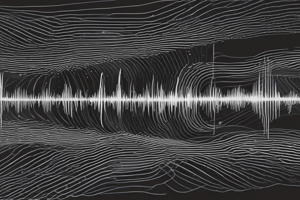Podcast
Questions and Answers
Which type of wave does not require a medium for propagation?
Which type of wave does not require a medium for propagation?
- Sound waves
- Water waves
- Light waves (correct)
- Seismic waves
What happens to sound waves as they travel through different mediums?
What happens to sound waves as they travel through different mediums?
- They require no medium to propagate
- They always increase in speed
- They cannot travel through liquids
- They travel faster in solids than in gases (correct)
Which statement about wave attenuation is true?
Which statement about wave attenuation is true?
- Electromagnetic waves do not experience attenuation
- Electromagnetic waves can travel vast distances with minimal attenuation (correct)
- All waves experience attenuation equally
- Only sound waves experience attenuation
What determines the color of light waves?
What determines the color of light waves?
Which type of waves requires a medium to propagate?
Which type of waves requires a medium to propagate?
What role does amplitude play in light waves?
What role does amplitude play in light waves?
What is true regarding electromagnetic waves?
What is true regarding electromagnetic waves?
Which of the following waves are typically unobservable to the human senses without specialized equipment?
Which of the following waves are typically unobservable to the human senses without specialized equipment?
In which type of medium does sound travel the fastest?
In which type of medium does sound travel the fastest?
What is the primary factor that affects the speed of sound in a medium?
What is the primary factor that affects the speed of sound in a medium?
Which of the following best defines loudness in sound?
Which of the following best defines loudness in sound?
What describes the behavior of particles in a sound wave?
What describes the behavior of particles in a sound wave?
How are pitch and loudness perceived in the auditory system?
How are pitch and loudness perceived in the auditory system?
Which of the following statements about wave propagation is accurate?
Which of the following statements about wave propagation is accurate?
What occurs during wave attenuation?
What occurs during wave attenuation?
Which characteristic of waves is specifically linked to the frequency of sound?
Which characteristic of waves is specifically linked to the frequency of sound?
What type of waves are seismic waves classified as?
What type of waves are seismic waves classified as?
Which factor does NOT influence the propagation of sound waves?
Which factor does NOT influence the propagation of sound waves?
What is the relationship between loudness and amplitude in sound waves?
What is the relationship between loudness and amplitude in sound waves?
Which misconception about sound waves is commonly held?
Which misconception about sound waves is commonly held?
What characteristic distinguishes seismic waves from other types of waves?
What characteristic distinguishes seismic waves from other types of waves?
What does the distance between successive peaks of a wave represent?
What does the distance between successive peaks of a wave represent?
Which statement accurately describes wave attenuation?
Which statement accurately describes wave attenuation?
How does the speed of sound differ in various media?
How does the speed of sound differ in various media?
Flashcards are hidden until you start studying
Study Notes
Sound Properties and Behavior
- The speed of sound varies with the medium; it travels faster in denser materials, such as solids, than in gases.
- Sound travels faster in water than in air, highlighting differences in density and speed between various media.
- Loudness relates to the perceived intensity (amplitude) of sound waves, while pitch corresponds to the perceived frequency of these waves.
- Sound waves transfer energy through the medium, causing particles to vibrate in the direction of the wave’s propagation, without the particles themselves traveling along with the wave.
Real-Life Applications and Teaching Implications
- Linking concepts in teaching to real-life scenarios makes the learning process more engaging and understandable for trainees.
- Examples of real-life applications of sound include the distance measurement of submarines and understanding seismic waves.
- Teachers are encouraged to incorporate methods that connect theoretical concepts to practical experiences in their lessons.
Wave Characteristics and Types
- Waves transfer energy without transferring physical particles; electromagnetic waves (like light) can move through a vacuum, while sound waves require a medium (like air or water).
- Certain waves, such as radio waves and X-rays, are not perceivable by human senses and require specialized equipment for detection.
- Different wave types exhibit varying speeds depending on the medium: sound is quicker in solids than in liquids or gases, while light speed is influenced by the medium (e.g., vacuum, air, glass).
Light Waves
- Frequency determines light color: higher frequency correlates to bluer light, while lower frequency relates to redder light.
- Amplitude impacts the brightness of light, with higher amplitudes producing brighter light.
- Light waves, as electromagnetic waves, do not need a material medium for propagation.
Seismic Waves
- Seismic waves, which are mechanical waves, demonstrate key concepts in wave behavior.
- Magnitude and strength of earthquakes are determined by seismic wave properties, including the distance between peaks.
Suggested Teaching Resources
- Trainees are encouraged to utilize resources such as the grade 9 physics textbook and the PHET simulation for a deeper understanding of wave characteristics and roles.
- Engaging in hands-on simulations allows students to visualize and comprehend the principles of force and wave behavior effectively.
Studying That Suits You
Use AI to generate personalized quizzes and flashcards to suit your learning preferences.




